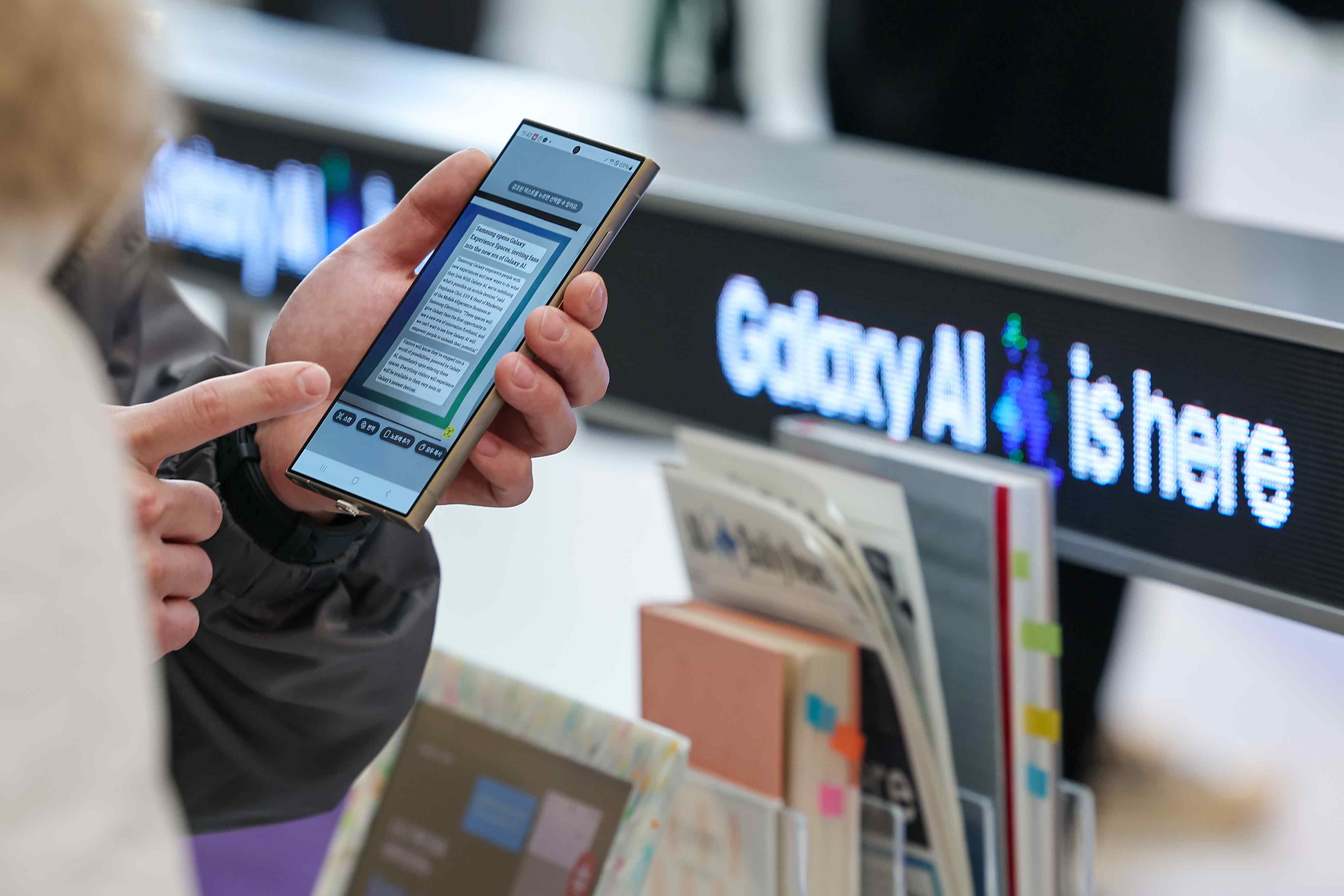Samsung smartphones equipped with AI features boast translation and interpretation functions. [사진 연합뉴스]
[이코노미스트 라예진 기자] A new paradigm for smartphones has begun. It is an ‘AI phone’ with artificial intelligence (AI) technology added. Following Samsung Electronics, which launched an AI phone early this year and attempted to dominate the market, Apple unveiled its AI operating system (OS) for the first time on October 28 (local time) and is preparing to release a smartphone with added AI functions. All are on-device AI types that have AI functions built directly into the smartphone without any external connection. In the second half of this year, the battle for the AI phone market between the two leading companies dominating the global smartphone market is expected to unfold in earnest.
Samsung was the first to open the door to the AI phone market. Samsung is pursuing a strategy to spread AI phones by launching the Galaxy S24 with added AI functions globally early this year. Samsung is embedding generative AI models, including the self-developed AI ‘Gauss’ and Google-provided ‘Gemini’, into its smartphones and has been releasing AI phones one after another from the S24 to the Flip 6 released last July.
In addition, the previous model also allows you to use AI functions by downloading an operating system with AI functions added. As a result, Samsung’s current smartphones capable of AI functions are 11 types, including the Galaxy Fold 6, Flip 6, Fold 5, Flip 5, Fold 4, Flip 4, S24 series, S23 series, S22 series, S24 FE, and S23 FE. We arrive.
Samsung is actively seeking to dominate the AI phone market. At the launch of the Galaxy S24, Noh Tae-moon, head of the Mobile Experience (MX) division, expressed his ambition to “install Galaxy AI on 100 million mobile devices within the year.” On October 24, the number of smartphone AI supported languages was expanded from 16 to 20, increasing the number of countries where Samsung’s AI phones can be used in their native language by four more.
Samsung’s priority launch of AI phones also increased its market share. After the launch of AI phones, Samsung unusually surpassed Apple in the U.S. market and took first place in market share. According to a report by market research firm CIRP, Samsung ranked first in the U.S. smartphone market with a 38% share as of March this year. Apple recorded 33%. This is the highest market share recorded in four years.
Apple Intelligence competes with Samsung AI features
The iPhone, with its AI function, analyzes emails that need to be read first and displays email notifications at the top. [사진 애플]
Apple released the new iOS 18.1, including AI features, on October 28 (local time). [사진 애플]
However, the launch of Apple’s AI ‘Apple Intelligence’ is expected to put a brake on Samsung’s dominance. Apple released iOS 18.1, an OS that includes AI functions, allowing iPhone users with iPhone 15 Pro or higher specifications to download the program. Many consumers expressed disappointment when the AI function was missing from the iPhone 16 released last September, but it is attracting attention again by releasing an AI function that even existing iPhone users can use in just over a month.
In particular, the AI function released by Apple includes a ‘call recording’ function that has never been provided by the iPhone before, raising user expectations. Apple has introduced a new AI function that records the call while simultaneously notifying the caller of the recording, and summarizes the recorded content in text.
Apple’s AI function was first released in English. The industry predicts that it will take more than two years for domestic users to freely use Apple’s AI functions in Korean. Compared to Samsung smartphones, which are already equipped with AI functions that support a total of 20 languages as well as Korean and English, Apple is expected to be significantly less competitive in non-English speaking markets.
Is it too much to play the role of a ‘game changer’?
Meanwhile, some believe that the emergence of AI phones will not have a significant impact on the smartphone market. Although the addition of AI functions to smartphones is new, it may be difficult to attract public sympathy enough to change existing smartphone models. According to data from market research firm IDC, the smartphone market is currently experiencing a recession, with global smartphone shipments reaching 1.16 billion units last year, the lowest in 10 years.
In reality, AI phones do not show any apparent change in device shape, like when changing from a feature phone (a cell phone before a smartphone that cannot use the Internet) to a smartphone. It is similar to the existing smartphone, but the functions used by the user are different, so it is difficult to make the public aware of the need to change the device.
Samsung is actively seeking to dominate the AI phone market. [사진 연합뉴스]
Additionally, the fact that the AI functions provided by Samsung and Apple are not significantly different makes them unattractive to consumers. Representative AI functions released by the two companies include functions such as recognizing voices and organizing voice content to act as an AI assistant, translating foreign languages, and erasing unnecessary parts of photos. Of course, Galaxy has the unique feature of simultaneous interpretation, but other than that, there are no groundbreaking features that have not been seen in other AI programs.
An industry insider said, “Apple will increase global demand for AI phones by releasing Apple Intelligence, but it remains to be seen whether it can serve as a ‘key’ to rapidly increase shipments in the smartphone market where the device replacement cycle has slowed. “There are many consumers who are already satisfied with their current smartphones, so it seems like we need more completely new AI features that will impress the public.”
ⓒThe Economist (Unauthorized reproduction and redistribution of ‘The Economist’s economic news for tomorrow’ is prohibited.


